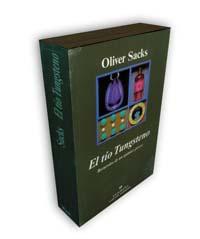Memories of a Chemical Child

Doctor Oliver Sacks and chemist Roald Hoffmann are his best friends. One day, Hoffmann, 1981 Nobel Prize in Chemistry, gave Sacks a special periodic table with photographs of all the elements. And next to the board he sent a very heavy metal bar. The bar fell to the ground and by the sound it made when it hit the ground and by what it noticed when catching it, Sacks quickly knew that metal: tungsten, which the Elhuyar brothers called wolfram.
This metal shook the memories of his childhood and wrote a book. Sacks was a small metal fan and had a guy who made tungsten bulbs. Uncle Tungsten. He taught him the secrets of chemistry.
From this point of departure, Oliver Sacks tells in this book memories related to science. It also tells the story of the family.
Born in London, his family is originally from Lithuania. At the age of six the Second World War began and, being Jews, they were afraid. Oliver and a brother were taken to a childish barnetegi, in central England, away from the bombing of London. The stay at the barnetegi was a nightmare, a space of hunger and discipline. For young Oliver, science and curiosity were the only psychological escapes.
After the war, he left the barnetegi. But life was not very easy. He had to face postwar times. Thanks to the products he got in the pharmacy around his home, Sacks kept his fondness for chemistry. He conducted an amateur laboratory and performed many experiments. He studied chemistry first hand.
The memories collected in this book reach some years after the war. Oliver Sacks was not a chemist. By family tradition he studied medicine and is a neurologist. And the writer. Precisely because of his books he has become famous outside the world of medicine.





